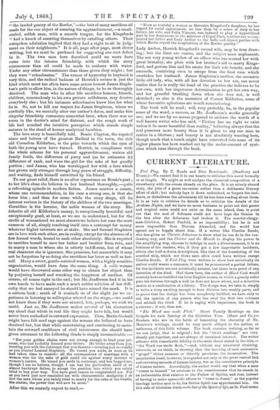CURRENT LITERATURE.
Foul Play. By C. Reade and Dion Boucicault. (Bradbury and. Evans.)—We cannot find it in our hearts to criticize this novel formally or at length. We might as well analyze the chemical composition of a strawberry with the cream already on the plate. It is an utterly absurd story, the joke of a great raconteur rather than a deliberate literary effort of skill; but nobody lays it down unfinished, or forgets the inci- dente, or disbelieves the adventures till he has done reading about them. It is as vain to criticize its details as to criticize the details of tho Arabian Nights, and we have no more business to point out that guano and tropical rains could not exist on the same island, than to point out that the seal of Solomon could not have kept the Genius in the box after the fisherman had broken it. The conviot-clergy- man-Crichton, Robert Penfold, is an impossibility; but he is not more impossible than Haronn Alraschid, and the world has agreed not to boggle about him. If a writer like Charles Reado, who has given us Christie Johnstone to show what he can do in the con- densing way, and the Cloister and the Hearth to display his power in the amplifying way, chooses to indulge in such a divertissement, it is no business of his readers, who, if they got a few improbable incidents, obtain also half-a-dozen descriptions, like that of the foundering of the scuttled ship, which not three men alive could have written except Charles Reads. If Foul Play were written to show how artistically its author could weave a romance, it must be pronounced a partial failure, for the incidents are not artistically natural, but there is no proof of any intention of the kind. Had there been, the author of Hard Cash would scarcely have so huddled the later English scenes, in which a greedy sailor puts his fortune through a wall he does not know where, and a detective assists at a condonation of a felony. The design was, we take it, simply to write a story exciting enough to boar division into weekly parts, and to prove that the design has been completely fulfilled, we have only to ask the opinion of any person who has read the first two volumes and mislaid the third. If he is raging with impatience, the book is a success ; if not, then not.






























 Previous page
Previous page